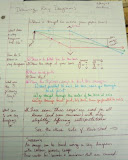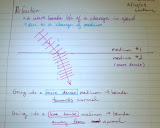Periods 1, 3, and 5 have class on Tuesday; periods 4 and 6, Wednesday. The plan is the same for both days.
Please finish the assignment from the previous class. That is due at the end of the period.
If you have time left, and everything else is done, you may work on this extra credit:
Draw scale ray diagrams of what you did in Lens Lab II
-Using your F and do data, find where your image should have formed.
-Compare to your data for di.
Have a safe Rodeo Break! See you Monday.
Wednesday, February 25, 2009
Monday, February 23, 2009
Monday, 2/23: Ray Diagrams Practice
Concept-Development 30-2 is due today. Please finish this and turn it in first.
Today you will be creating your own ray diagrams to scale. The "to scale" part is very important and is the topic of today's bellwork. Please see me if you need help creating a scale and/or using a scale.
The assignment:
Using scale ray diagrams, find di (the distance to the image) for each of the following:
1. Convex lens, f=2 km and do (distance to the object)=4 km
2. Convex lens, f=10 cm and do=40 cm
3. Convex lens, f=100 cm and do=50 cm
4. Concave lens, f= -5 ft and do=7 ft
Note that #4 has a negative focal length. Don't worry about this; it is simply a sign convention that we have not learned. In your ray diagram, you will treat f= -5 ft just like you would treat f= +5ft.
This is due the next time I see you (Tuesday for per. 1, 3, 5 and Wednesday for per. 4 and 6).
Today you will be creating your own ray diagrams to scale. The "to scale" part is very important and is the topic of today's bellwork. Please see me if you need help creating a scale and/or using a scale.
The assignment:
Using scale ray diagrams, find di (the distance to the image) for each of the following:
1. Convex lens, f=2 km and do (distance to the object)=4 km
2. Convex lens, f=10 cm and do=40 cm
3. Convex lens, f=100 cm and do=50 cm
4. Concave lens, f= -5 ft and do=7 ft
Note that #4 has a negative focal length. Don't worry about this; it is simply a sign convention that we have not learned. In your ray diagram, you will treat f= -5 ft just like you would treat f= +5ft.
This is due the next time I see you (Tuesday for per. 1, 3, 5 and Wednesday for per. 4 and 6).
Friday, February 20, 2009
Friday, 2/20: Ray Diagrams
We are now entering the wonderful world of ray diagrams. These will explain what was going on in your lab yesterday as well as how the lenses for fightsighted and nearsighted people work.
Your homework is to finish the back side of Concept-Development 30-2.


Your homework is to finish the back side of Concept-Development 30-2.


Thursday, February 19, 2009
Wednesday, February 18, 2009
Wednesday, 2/18: Test 2
The second test this semester covers light, reflection, and refraction.
After your test, you received Concept-Development 30-2. Please finish the front by Friday. The whole thing will be due on Monday.
After your test, you received Concept-Development 30-2. Please finish the front by Friday. The whole thing will be due on Monday.
Labels:
homework,
light,
reflection,
refraction
Tuesday, February 17, 2009
Tuesday, 2-17: Focal Point/Length and Lens Lab II
Today we started Lens Lab II by finding the focal length of a lens assigned to your group. We also played a bit with the equipment we will be using on Thursday for the lab.


Monday, February 16, 2009
Thursday, February 12, 2009
Thursday, 2/12 and Friday, 2/13: Test 2 Review
Today and tomorrow are your days to review for your test next Wednesday. The test will cover light, reflection, and refraction. The review questions are below.
We also counted teacher stamps today.
Semester 2 Test 2 Review
The test is on Wednesday, February 18, 2009.
In addition to the questions below, you need to be able to list the entire electromagnetic spectrum in order and to tell me who can see whom in a mirror.
p.419-420
8. How do the frequencies of infrared, visible, and ultraviolet light compare?
18. Distinguish between an umbra and a penumbra.
20. What is the difference between light that is polarized and light that is not?
24. What evidence can you cite to support the idea that light can travel through a vacuum?
p. 439
2. Are black and white real colors, in the sense that red and green are? Explain.
p. 460-462
4. What is meant by the normal to a surface?
5. What is the law of reflection?
6. When you view your image in a plane mirror, how far behind the mirror is your image compared with your distance from the mirror?
12. Distinguish between reflection and refraction.
13. When a wave crosses a surface at an angle from one medium into another, why does it “pivot” as it moves across the medium into the new medium?
28. Suppose that a mirror and three lettered cards are set up as in the figure. If a person’s eye is at point P, which of the lettered cards will be seen reflected in the mirror? Explain.

30. Trucks often have signs on their backs that say, “If you can’t see my mirrors, I can’t see you.” Explain the physics here.
35. If you were spearing a fish with a spear, would you aim above, below, or directly at the observed fish to make a direct hit? Would your answer be the same if you used laser light to “spear” the fish? Defend your answers.
39. Suppose you walk toward a mirror at 1 m/s. How fast do you and your image approach each other? (The answer is not 1 m/s.)
We also counted teacher stamps today.
Semester 2 Test 2 Review
The test is on Wednesday, February 18, 2009.
In addition to the questions below, you need to be able to list the entire electromagnetic spectrum in order and to tell me who can see whom in a mirror.
p.419-420
8. How do the frequencies of infrared, visible, and ultraviolet light compare?
18. Distinguish between an umbra and a penumbra.
20. What is the difference between light that is polarized and light that is not?
24. What evidence can you cite to support the idea that light can travel through a vacuum?
p. 439
2. Are black and white real colors, in the sense that red and green are? Explain.
p. 460-462
4. What is meant by the normal to a surface?
5. What is the law of reflection?
6. When you view your image in a plane mirror, how far behind the mirror is your image compared with your distance from the mirror?
12. Distinguish between reflection and refraction.
13. When a wave crosses a surface at an angle from one medium into another, why does it “pivot” as it moves across the medium into the new medium?
28. Suppose that a mirror and three lettered cards are set up as in the figure. If a person’s eye is at point P, which of the lettered cards will be seen reflected in the mirror? Explain.

30. Trucks often have signs on their backs that say, “If you can’t see my mirrors, I can’t see you.” Explain the physics here.
35. If you were spearing a fish with a spear, would you aim above, below, or directly at the observed fish to make a direct hit? Would your answer be the same if you used laser light to “spear” the fish? Defend your answers.
39. Suppose you walk toward a mirror at 1 m/s. How fast do you and your image approach each other? (The answer is not 1 m/s.)
Labels:
light,
reflection,
refraction
Wednesday, February 11, 2009
Wednesday, 2/11: Prisms and Rainbows
How do prisms work? What does that have to do with rainbows? These are the questions pondered today. I will post the notes as soon as possible.
Due: Concept-Development 29-3
Due: Concept-Development 29-3
Labels:
light,
refraction
Tuesday, February 10, 2009
Tuesday, 2/10: Total Internal Reflection
First, a reminder: your homework, to answer the question "Why does a pencil look bent when partially submerged in water?" is due today. Going over the answer is the first thing on our agenda.
Next, we discuss total internal reflection:what it is and examples. Partial notes are below.
Finally, we start working on tonight's homework, Concept-Development 29-3. This is due tomorrow.

Next, we discuss total internal reflection:what it is and examples. Partial notes are below.
Finally, we start working on tonight's homework, Concept-Development 29-3. This is due tomorrow.

Labels:
homework,
light,
reflection,
refraction,
waves
Monday, February 9, 2009
Monday, 2/9: Refraction
Today we went outside and warched in a wavefront formation to simulate refraction. Partial notes are below.
Homework, due tomorrow: answer the question, "Why does a pencil look bent when partially submerged in water?"

Homework, due tomorrow: answer the question, "Why does a pencil look bent when partially submerged in water?"

Labels:
homework,
light,
refraction,
waves
Friday, February 6, 2009
Friday, 2/6: 4.5 Week Progress Reports
Today is a work day; grades will be submitted today at 15:00. Please use today to finish and turn in anything you have, including last night's homework (Concept-Development 29-2).
Thursday, February 5, 2009
Thursday, 2/5: Reflections
Using today's bellwork, today I showed you a trick to figure out what is visible in a mirror. The rest of the period was spent working on Concept-development 29-2, which is due tomorrow.
Due today: Concept-Development 29-1

Due today: Concept-Development 29-1

Labels:
homework,
notes,
reflection
Wednesday, February 4, 2009
Wednesday, 2/4: The Law of Reflection and Line of Sight
Today we jumped from the lab results of yesterday into the Law of Reflection and line of sight.
Homework: Concept-Development 29-1, due tomorrow


Homework: Concept-Development 29-1, due tomorrow


Labels:
homework,
light,
notes,
reflection
Tuesday, February 3, 2009
Tuesday, 2/3: Mirror Lab I
We covered the windows and the glowing wireless router. We broke out the mirrors, ancient light sources, and protractors, and flashlights. Time for the first mirror lab.
No homework tonight, but you do need to get yourself a protractor and ruler as soon as possible.

No homework tonight, but you do need to get yourself a protractor and ruler as soon as possible.

Labels:
reflection
Monday, February 2, 2009
Monday, 2/2: Polarization of Light
Today's lesson was very demonstration-based, so I hope you didn't miss it. If you did, there are notes below; not as good as being there, but they might help.
Due today: EM Spectrum drawing
No homework tonight.

Due today: EM Spectrum drawing
No homework tonight.

Subscribe to:
Comments (Atom)




